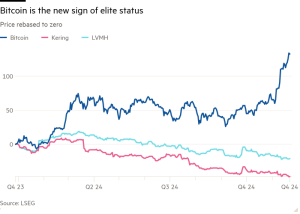Rheinmetall to make gun barrels in the UK as part of new defence pact
Unlock the Editor’s Digest for free
Roula Khalaf, Editor of the FT, selects her favourite stories in this weekly newsletter.
German arms maker Rheinmetall will produce gun barrels in the UK as part of a sweeping new defence pact between Berlin and London aimed at deepening military co-operation and bolstering support for Ukraine.
A new factory will form part of a worldwide drive by supporters of Kyiv to boost the production of artillery and ammunition after Vladimir Putin’s full-scale invasion depleted stocks and rammed home the inadequacies of existing supply chains.
The plant, whose location is yet to be determined, will from 2027 begin producing barrels for artillery pieces and main battle tanks, specifically for 120mm and 155mm howitzer calibres, as well as for the British Challenger 3 tank.
It will mean that artillery barrels are being manufactured in the UK for the first time in a decade, and they will use steel components produced by Sheffield Forgemasters.
Rheinmetall chief executive Armin Papperger told the FT the company’s investment in Britain would ensure that “the UK remains a leader in developing and manufacturing defence technologies that safeguard both national and global security”.

Germany’s largest defence contractor said it could “imagine” one day also producing explosive powder for ammunition in the UK, adding that it was striving to boost the “sovereign capabilities” of its customers.
The facility forms part of efforts to intensify British-German defence industry co-operation under a wider pact to be signed by UK defence secretary John Healey and his German counterpart Boris Pistorius on Wednesday.
Healey described the planned agreement — to be confirmed at a ceremony at Trinity House in the City of London — as a “milestone moment” in the UK’s relationship with Germany and “a major strengthening of Europe’s security”. Pistorius said that the two nations were “moving closer together”.
The defence agreement will form the first “pillar” of a wider UK-Germany treaty that was pledged by UK Prime Minister Keir Starmer and German Chancellor Olaf Scholz in August and is expected some time early next year.
The deepening relationship comes as the UK’s new Labour government strives to rebuild bridges with European allies after years of post-Brexit strain. London hopes it will also foster more three-way teamwork with France, with whom Germany and the UK each have their own defence agreements. Berlin, meanwhile, is seeking to overhaul its own approach to defence and security in response to Russian aggression following decades of complacency and under-investment.
At the same time, countries across much of Europe are seeking to bolster co-operation amid deep foreboding about next month’s US elections. They fear that victory for Donald Trump would mean the end of US military support for Ukraine and cast doubt over the future of Nato.
Germany and the UK are, after the US, the second and third biggest providers of military support to Ukraine, giving around €15bn and €14bn, respectively, since 2022, according to the Kiel Institute for the World Economy. The two countries are also Europe’s biggest spenders on defence.
The new agreement includes plans for German and UK troops to hold more joint exercises in the Baltic states Estonia and Lithuania as part of efforts to strengthen Nato’s eastern flank.
The two nations will also work together to protect critical underwater infrastructure on the seabed of the North Sea amid fears of Russian sabotage. German P8 aircraft will begin occasional operations out of Lossiemouth air base in Scotland to help protect the north Atlantic.
Beyond the new gun-barrel facility, Rheinmetall is also planning more joint work with UK companies on new versions of the Challenger 3 tank and Boxer armoured vehicle that it already produces in the UK. There are also plans for co-operation on drones, and for arming German Sea King helicopters.
Britain has already announced that it will join a pan-European project to develop long-range missiles to help address gaps in the continent’s defences that have been exposed by the war in Ukraine.
Past attempts at UK participation in European defence projects have often been fraught, with France in particular harbouring misgivings despite a similar bilateral defence pact — the Lancaster House treaty — signed by London and Paris in 2010.
But Ed Arnold, of the London-based Royal United Services Institute think-tank, said that the focus on land-based systems would create “a very strong foundation” on which to build.
“We’re very excited about [the pact],” said one defence industry figure. “We would have continued to invest regardless, but having the political framework in place makes it easier and sets the tone.”
The deal does not include any agreement on the thorny issue of arms exports, a key issue for the British side. Germany has in the past blocked the export of jointly-produced weapons to countries such as Saudi Arabia and Turkey, which has affected partnerships like a consortium that includes Britain’s BAE Systems making fighter jets.
German opposition has recently softened, with Berlin giving the green light for exports of the Eurofighter Typhoon to Riyadh at the start of this year.
Technical talks have also begun on selling the jet to Turkey. British officials are quietly hopeful that Scholz, who met with Turkish President Recep Tayyip Erdoğan in Istanbul on Saturday, will eventually give the go-ahead for a deal with Ankara.
#Rheinmetall #gun #barrels #part #defence #pact




